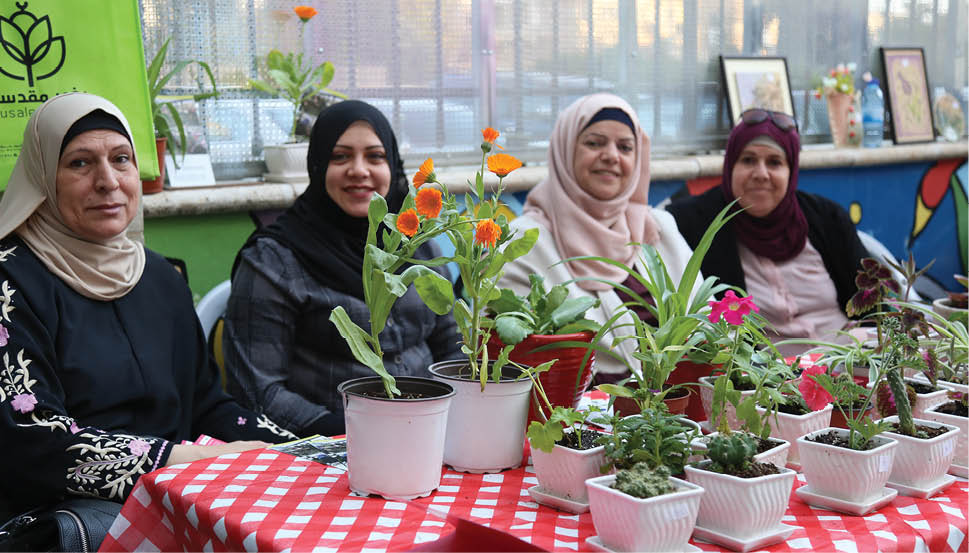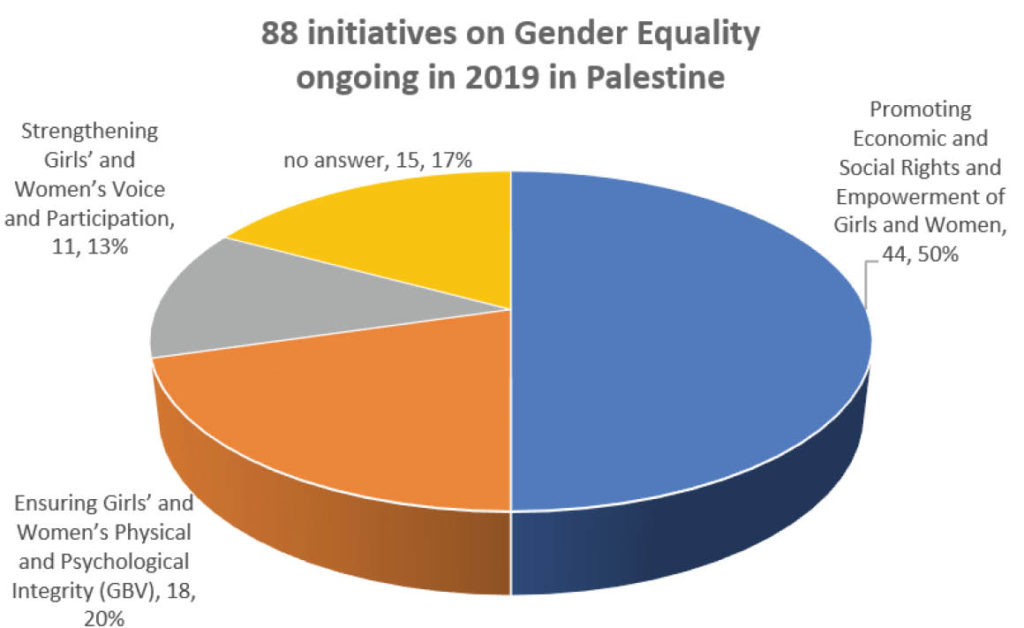The international community must track how efficiently aid projects tackle the promotion of gender equality. In November, the European Union and like-minded donors active in the field of gender equality and women’s empowerment collected relevant information regarding 88 ongoing cooperation initiatives with either an overall gender focus or a component related to gender equality.*2 This mapping exercise was conducted by the Italian Agency for Development Cooperation (AICS) in its capacity as European Lead Donor for Gender Equality and chair of the Gender Technical Working Group (GTWG) in Palestine. Within the framework of the European Joint Strategy in Palestine, GTWG represents a good practice to enhance the harmonization and effectiveness of the gender programs of EU member states and like-minded states. GTWG actions are based on common European values for gender equity and women´s empowerment, which includes advocacy initiatives, joint actions, and outreach activities to Palestinian partners and institutions.
Gender equality is widely recognized as a crucial condition for development- and democratic transition processes, necessary to boost economic growth and pave the way for long-term inclusiveness and sustainability.*1
Half of the mapped interventions prioritize the promotion of economic and social rights and the empowerment of Palestinian girls and women, and more than 20 percent concentrate their efforts on the reduction of the incidence of violence against women and girls, aiming to ensure their physical and psychological integrity. European donors design their actions within the frameworks of the 2017–2020 National Policy Agenda: Putting Citizens First and the 2017-2020 EU Joint Strategy in Support of Palestine. In particular, most of the actions for gender equality are aligned with what has been formulated by the labor, health, and social protection sectors of the Joint Strategy.
Women’s economic empowerment is an ambitious and challenging goal, especially when we consider the structural economic crisis of the country. It is equally vital for Palestine to secure women’s and girls’ contributions to national growth. Palestine will benefit from their skills and knowledge as society’s most educated segment and profit from their multifaceted vision of the country’s future. It is therefore in the national interest to promote an enabling environment with adequate services and legislation, non-discriminatory scales of retribution, and equal job opportunities. Such an enabling environment must be realized also in the private sphere of households, where women’s responsibilities in terms of family management, care of each individual, communication, hygiene, logistics, and accountability should allow enough space for commitments at workplaces. Otherwise, the burden would be too heavy for most Palestinian women – not a desirable outcome for interventions led by a “do no harm” principle.

On the contrary, the challenge to share between women and men both spheres of responsibilities might open the door to positive transformation. Options should be found in terms of either outsourcing a woman’s care work or sharing it with partner(s). Even in a difficult economic context, such solutions can generate new job opportunities and contribute to a redefinition of pre-constituted gender roles and dynamics; they would lead to a better understanding of others’ perspectives among members of the family network and blur the clearly marked borders of inherited stereotypes.
Based on the testimonies of women involved in interventions supported by AICS, we have learned how relevant and motivating the availability of a strong support network is in the construction and stabilization of micro enterprises. In particular, female colleagues and business partners value the capacities and see the potential of each member. Mutual support and practical solutions for ongoing challenges have emerged as natural consequences of sharing – particularly in situations when businesses were at the risk of failure. Personal resilience, developed at times at the cost of experiencing domestic violence, can create strong bonds of trust and understanding. Alliances were established quickly for the joint purchase of goods, multiplication of showrooms, or exchange of services. Encounters also offer inspiration, as partners can serve as achievable role models when the small steps that have been taken to implement relevant changes in lives are shared and analyzed together. Thus, women’s economic empowerment is a component also of the response to gender-based violence. Economic independence frequently is key to overcoming both the low self-esteem resulting from abuse and the financial limitations experienced by survivors in providing for their children, who tend to be invisible victims as witnesses.

Much has been done to contribute to efforts to lift the existing obstacles to women’s empowerment in Palestine, both in the economic and personal spheres. The results of the many processes that have been started in the last years will be observed and reaped in the long term. But we shall all engage in guaranteeing that such empowerment does not become a burden for Palestinian women, placing the responsibility of establishing entrepreneurial initiatives or of personal emancipation from violence uniquely on their shoulders. Making the path of empowerment a collective effort rather than an individual endeavor is key.
*1 For more information, please visit Gender Equality: The unfinished business of our time, United Nations Global Issues, available at https://www.un.org/en/sections/issues-depth/gender-equality/
*2 The initiatives taken into consideration are supported by 16 donors (Austria, Belgium, Canada, Denmark, EUPOL-COPPS, European Union, Finland, Germany, Italy, The Netherlands, Norway, Republic of Korea, Spain, Sweden, Switzerland, and the UK).


